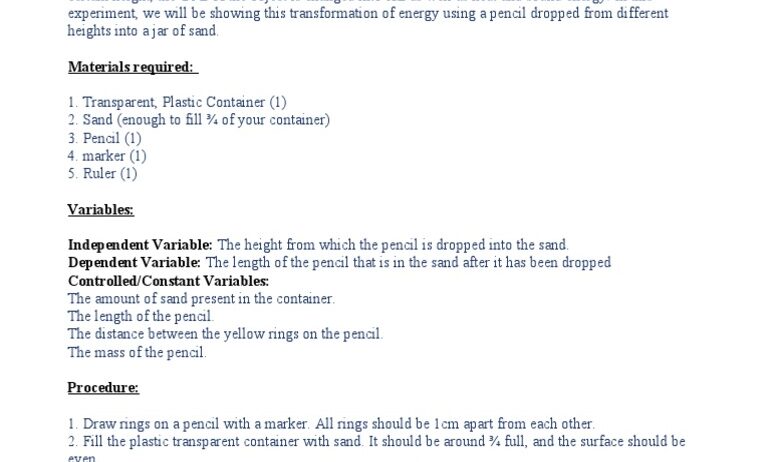The Law of Conservation of Energy is one of the fundamental principles in physics that stipulates energy cannot be created or destroyed; it can only be transformed from one form to another. This concept provides invaluable insight into understanding the workings of the universe and lays the foundation for a multitude of scientific disciplines. The implications of this law extend beyond mere academic inquiry, influencing a range of practices and innovations in technology, environmental science, and even economy.
The essence of the Law of Conservation of Energy beckons a profound shift in perspective – encouraging individuals to contemplate not just energy consumption, but the ramifications of its transformation and usage in every facet of life. Energy manifests in various forms: kinetic, potential, thermal, and chemical, to name a few. When exploring these forms, one begins to appreciate the continuous cycle of energy as it metamorphoses within closed systems. For instance, when an object is lifted, its potential energy increases; when it falls, that potential energy translates into kinetic energy. This conversion signifies that while the form of energy may change, the total energy remains constant.
Historically, the understanding of energy conservation has evolved through many revolutionary scientific advancements. Prominent figures such as James Prescott Joule and Albert Einstein have significantly contributed to the exploration and elucidation of energy conservation, reinforcing its pivotal position in our comprehension of physical interactions. Joule’s experiments demonstrated that mechanical work could produce thermal energy, while Einstein’s theory of relativity revealed the equivalence of mass and energy — encapsulated in the famous equation E=mc². Such revelations illuminate the intricate interconnectedness of matter and energy, urging society to rethink the way energy is perceived and utilized.
The real-world applications of the Law of Conservation of Energy are manifold. In the field of engineering, for instance, energy conversion plays a critical role in designing efficient systems capable of optimizing energy flow. From renewable energy sources such as solar panels and wind turbines to fossil fuel combustion engines, engineers strive to capitalize on the energy transformation processes while adhering to the conservation law. By maximizing the efficiency of these systems, we can significantly reduce waste and lower our overall carbon footprint, thus contributing to environmental sustainability.
Furthermore, the principles of energy conservation lend themselves to various strategies in environmental protection. In the quest for a more sustainable future, it becomes imperative to acknowledge that energy use profoundly impacts our ecosystems. The transformation of energy often correlates directly with greenhouse gas emissions and the resultant climate change. By embracing the Law of Conservation of Energy, we can initiate dialogues about the need for sustainable practices that focus on renewable resources. This shift prioritizes the conservation of energy not merely as a theoretical concept, but as a practical guideline for enhancing ecological resilience.
One noteworthy example of energy conservation initiatives is the emergence of energy-efficient appliances and vehicles. The rise of smart technology enhances the ability to monitor and optimize energy usage in homes and businesses. With innovations such as LED lighting and energy star-rated appliances, consumers can actively partake in the global movement toward reducing energy consumption. By understanding the transformations that occur within energy systems, individuals can make informed choices that contribute to a more sustainable environment.
The education of future generations about the Law of Conservation of Energy is equally paramount. By integrating this principle into curricula, educational systems pave the way for a populace that appreciates the delicate balance required for sustainable living. When young minds grasp the interrelations between energy forms, they not only become empowered through knowledge but are encouraged to innovate solutions that address current environmental challenges. This curiosity-driven learning fosters a proactive mindset that transcends simple awareness of energy issues and motivates tangible action.
However, challenges persist in championing the conservation of energy. The allure of convenience often overshadows the principles of sustainability, leading to a culture of excess and waste. In contemporary society, the demand for instant gratification can conflict with the rigorous application of the conservation laws. At times, this mindset fosters an assumption that energy is abundant and inexhaustible, which is a fallacy. As natural resources dwindle and the impacts of climate change grow increasingly severe, the urgency to embrace the Law of Conservation of Energy becomes even more pronounced.
To instigate a deeper understanding of energy conservation, one must explore the philosophical underpinnings that inform our perception of energy use. At its core, the Law of Conservation of Energy challenges us to confront the consequences of our actions. By recognizing that every energy use incurs an environmental obligation, we begin to view energy not as a mere commodity but as an integral component of our existence. Such consciousness demands a fundamental reevaluation of our lifestyles, encouraging sustainable practices beyond superficial compliance.
In conclusion, the Law of Conservation of Energy stands as an unbreakable rule of science that authentically reflects the interconnectedness of the universe. The promise it holds for reshaping our relationship with energy urges a compelling curiosity that compels individuals and societies to explore deeper into the implications of their energy practices. As we stand at the crossroads of environmental responsibility and technological advancement, embracing the principles of energy conservation can facilitate sustainability and foster a more harmonious relationship with our planet. The journey toward energy conservation is not merely an obligation; it is an invitation to cultivate curiosity, inspire innovation, and promote ecological stewardship for generations to come.






